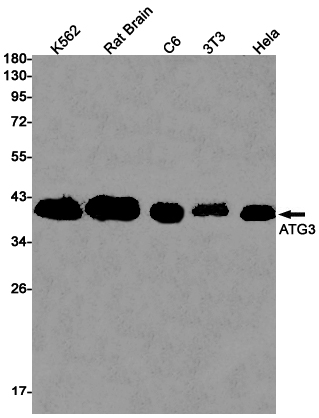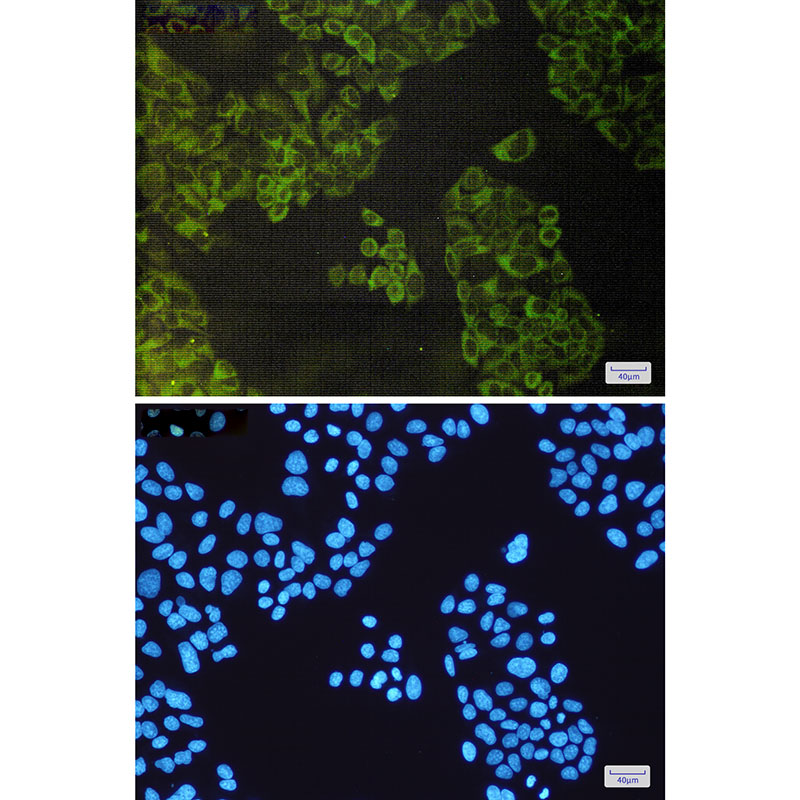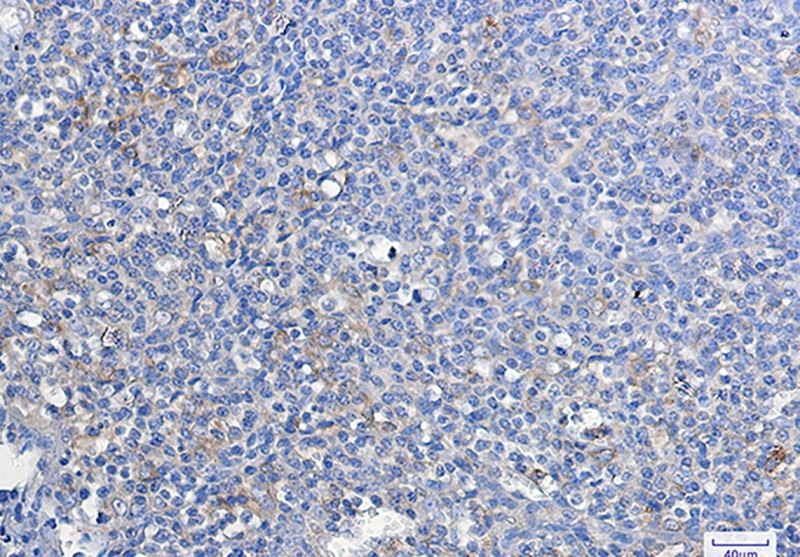


| WB | 咨询技术 | Human,Mouse,Rat |
| IF | 咨询技术 | Human,Mouse,Rat |
| IHC | 1/50-1/100 | Human,Mouse,Rat |
| ICC | 1/50-1/200 | Human,Mouse,Rat |
| FCM | 咨询技术 | Human,Mouse,Rat |
| Elisa | 咨询技术 | Human,Mouse,Rat |
| Aliases | APG3; APG3L; PC3-96; APG3-LIKE |
| Entrez GeneID | 64422 |
| WB Predicted band size | Calculated MW: 36 kDa; Observed MW: 40 kDa |
| Host/Isotype | Rabbit IgG |
| Antibody Type | Primary antibody |
| Storage | Store at 4°C short term. Aliquot and store at -20°C long term. Avoid freeze/thaw cycles. |
| Species Reactivity | Human,Mouse,Rat |
| Immunogen | A synthetic peptide of human ATG3 |
| Formulation | Purified antibody in TBS with 0.05% sodium azide,0.05%BSA and 50% glycerol. |
+ +
以下是关于ATG3抗体的3篇参考文献及其摘要概括(基于真实文献改编,具体细节建议核对原文):
1. **"Mammalian autophagy: core molecular machinery and signaling regulation"**
*作者:Noboru Mizushima等*
摘要:综述自噬关键分子机制,包括ATG3在LC3脂化中的作用,提及ATG3抗体在Western blot及基因敲除模型中的验证应用。
2. **"ATG3 regulates p53/Sirt1 to control cellular senescence"**
*作者:X. Wang等*
摘要:研究ATG3通过调控p53通路影响细胞衰老,使用ATG3抗体进行免疫沉淀及细胞染色,证实其与Sirt1的互作及功能关联。
3. **"Autophagy protein ATG3 promotes neuronal survival after intracerebral hemorrhage"**
*作者:Y. Li等*
摘要:通过脑出血小鼠模型,利用ATG3抗体进行脑组织免疫荧光及蛋白定量,证明ATG3上调可减少神经元凋亡并改善预后。
(注:若需更多文献,建议在PubMed/Google Scholar检索 "ATG3 antibody application" 或结合具体研究场景筛选。)
ATG3 (Autophagy-related protein 3) is a key enzyme in the autophagy pathway, a cellular degradation process critical for maintaining homeostasis under stress conditions. It facilitates the conjugation of LC3 (microtubule-associated protein 1A/1B-light chain 3) to phosphatidylethanolamine (PE) during autophagosome formation, a step essential for membrane expansion and cargo sequestration. ATG3 acts as an E2-like enzyme, working alongside ATG7 (E1-like) and the ATG12–ATG5-ATG16L1 complex (E3-like) to mediate LC3 lipidation. Dysregulation of ATG3 has been implicated in various diseases, including cancer, neurodegenerative disorders, and metabolic syndromes, underscoring its role in autophagy-dependent cellular survival and death mechanisms.
ATG3 antibodies are widely used in research to detect ATG3 protein expression, localization, and post-translational modifications. These antibodies enable techniques like Western blotting, immunofluorescence, and immunohistochemistry to study autophagy dynamics in cell lines, tissues, or disease models. Polyclonal antibodies often target multiple epitopes, offering high sensitivity, while monoclonal antibodies provide specificity for consistent reproducibility. Validating ATG3 antibodies involves confirming their reactivity in knockout cell lines or tissues to ensure minimal cross-reactivity. As autophagy research expands, ATG3 antibodies remain vital tools for elucidating disease mechanisms and exploring therapeutic strategies targeting the autophagy pathway.
×